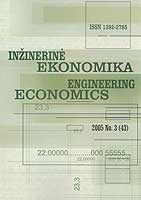Reasons for the Practice of Employees’ Involvement in the Company’s Management
Reasons for the Practice of Employees’ Involvement in the Company’s Management
Author(s): Leonas ŽitkusSubject(s): Business Economy / Management, Human Resources in Economy, EU-Legislation
Published by: Kauno Technologijos Universitetas
Keywords: involvement of employees; enterprise management; business effectiveness; legal standards; precondition of competitiveness;
Summary/Abstract: The article deals with various reasons, encouraging enterprises of Lithuania to apply the practice of involvement of employees into enterprise management, widely applied in the countries of Western Europe. The main aim of a modern enterprise management should be the increase of business effectiveness in the context of globalization and European integration. To achieve this aim, special attention should be paid to the factors expressing abilities for the increase of business effectiveness. Among the factors the most important place is taken by the adequacy of enterprise management to the situation, which is caused by increasingly intensifying progress of science and technology as well as formation of the information society. After Lithuania has become a member of the EU the practice of employee involvement into enterprise management will have to be introduced in enterprises of Lithuania, because this is one of the requirements listed in the EU agreements and legal documents. Most of these documents are not legally binding (except the EU directives), however they oblige to accept political obligations. Knowing the diligence of Lithuanian politics in the implementation of such obligations (especially in transferring the EU directives into the national law), one can expect quite concrete and strict requirements in this sphere. Apart from the legal obligations, the practice of employee involvement as well by the market economy mechanisms are encouraged. Most theories and conceptions acknowledge the application of more effective management forms to be the most important guarantee of modern competitiveness. Seeking to become competitive in the EU internal market, enterprises of Lithuania will have to adopt practice of enterprises of the Western European countries, because the old means of competitiveness, like cheap labour force, less expensive raw materials from the East, close neighbourhood of the Eastern markets cannot assure successful business development. The analysis presented in the article shows, that involvement of employees into enterprise management is a complex problem. It is evident that legal regulation is not a sufficient reason for the application of this practice on a wide scale. The limit at which the “socialization” of labour relations enhances competitiveness is not clearly defined. At the moment Central and East European countries possess many more efficient and not employed so far ways of enhancing competitiveness. Therefore the practice of employees’ involvement common in West European countries such as Germany, Belgium, Netherlands, Sweden, may find itself not so common in the new EU Member states.
Journal: Engineering Economics
- Issue Year: 2005
- Issue No: 1 (41)
- Page Range: 59-66
- Page Count: 8
- Language: English

